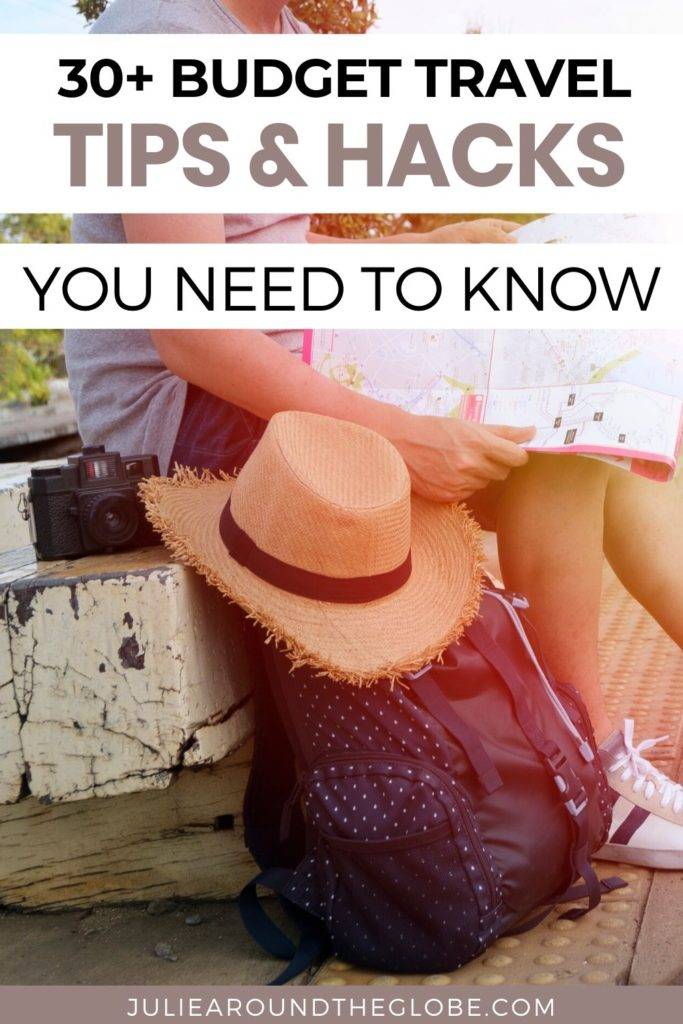
30+ secret travel hacks to save thousands of dollars
Last Updated on November 5, 2022
I always laugh when I see guides claiming that you can travel the world for free or how, you too, can budget-travel only spending three thousand dollars in a week. No, you can’t travel for free unless you’re a super famous influencer or your job requires you to travel but yes, you can travel for way less than three thousand a week.
When I travel I spend around 300 to 500 USD a month, flights excluded. I once met a guy from Malaysia who had just gotten back from a 5-month trip to Europe, where he had spent an average of 400 euros a month, including his flights. There are many ways you can travel without having a lot of money, here are some practical, actionable tips to help you travel with a small budget.
Disclaimer: This post contains affiliate links, which means that if you click on any links and make a purchase, I’ll get a small commission, at no cost to you.
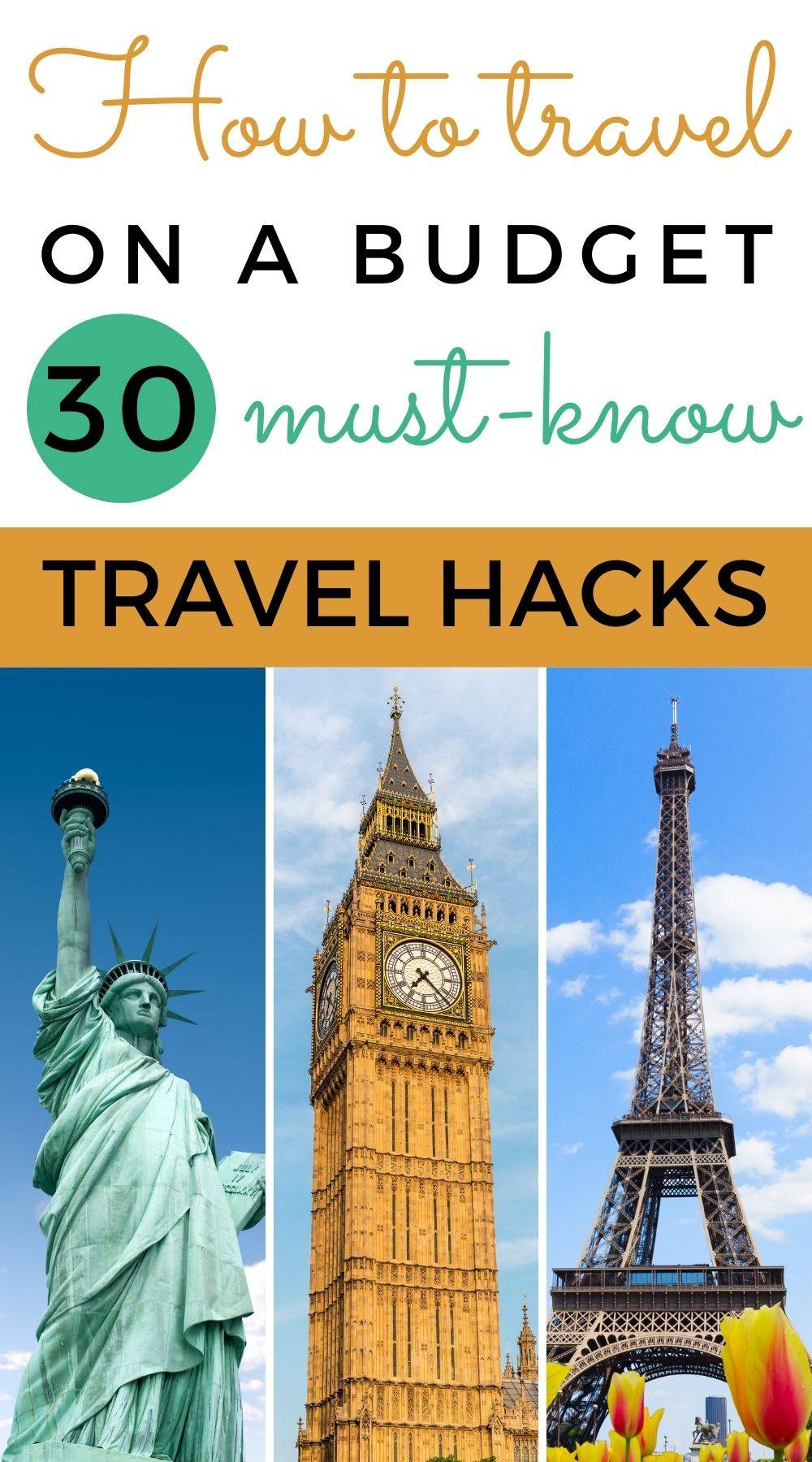
Save money on flights
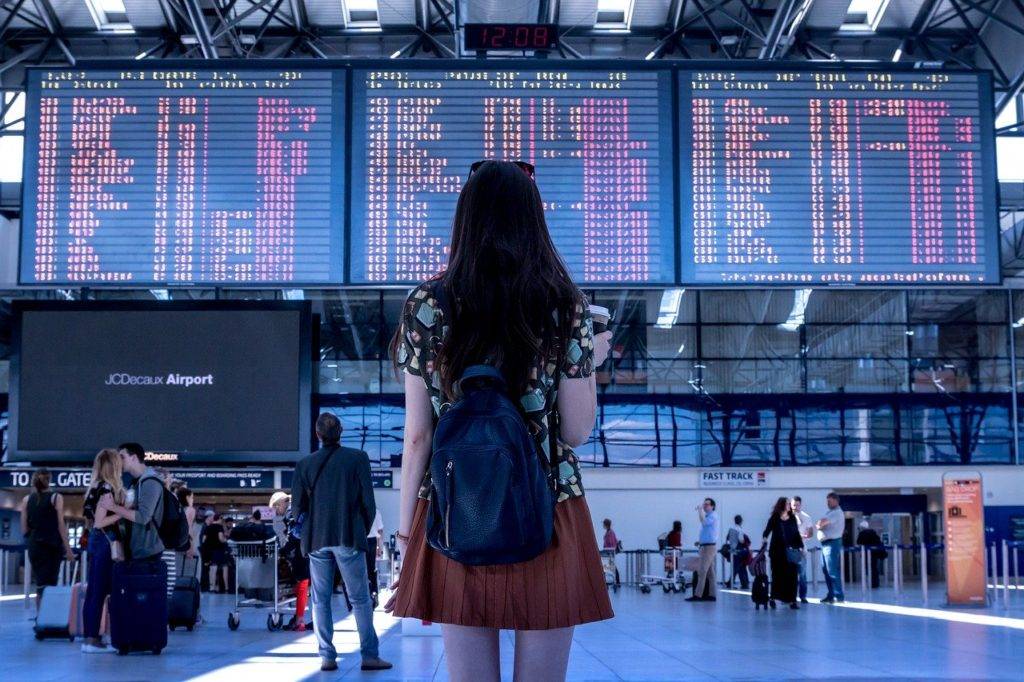
1 – Be flexible on dates
If you can, try to be flexible on the dates. Sometimes, leaving a day early can save you hundreds of dollars. Try also to travel during low seasons, everything will be cheaper.
2 – Be flexible on the destination
You can find amazing deals on websites like Groupon and such, but you’ll need to be flexible. You can also check out Skyscanner, on the app you have the option to see all the best deals from your city, without having to add dates or even a destination. It’s a great way to find cheap plane tickets.
3 – Don’t go to the other side of the world
The farther you go, the more expensive the flight tickets will be. If you don’t have the budget to go far, consider traveling to nearby countries. Additionally, the more you’re able to save on flights, the more money you’ll have to enjoy your vacation.
4 – Research flights
Start planning your trip well ahead. Plane tickets are usually cheaper when you book them far in advance. You can find great last-minute deals but it’s a gamble. You can use Hopper, an app that predicts if the price for a flight is going to go up or down.
5 – Leave from a farther airport
Check for flights from nearby airports or other big international airports easily reachable from where you are. You can save hundreds of dollars, leaving from a different airport.
6 – Don’t be scared of long layovers
Direct flights are usually more expensive than flights with layovers. Having a long layover can be a great opportunity to visit another city for a few hours. Just make sure the country allows people to leave the airport without a visa and that you’ll be there during the day.
7 – Travel light – Do you really need four pairs of shoes?

Learning how to travel with a carry-on only is a must and will help you save money when booking flights. I manage to pack a week’s worth of clothing into a carry-on. For toiletry, pack dry products (like these ones), you can almost find anything in solid form (shampoo, toothpaste, lotion…).
Saving money when planning your trip
8 – Travel to “cheap countries”
All countries are not equal budget-wise, research places where food, transportation, activities, and accommodations are cheap. Some of the cheapest destinations in the world are in Southeast Asia (you’ll pay around 10 US in the Philippines for a day of island hopping, a meal in Vietnam cost less than a buck).
9 – Travel to visa-free countries
Check the visa requirements for the country you’re going to visit. Do you need a visa? Do you need to go to the embassy? or can you do it online? And finally, how much does it cost? Many countries offer free visa on arrival, while others can charge you 100 bucks.
10 – Slow Travel
The faster you travel the more money you spend within the same time frame. Slow travel is best when you’re long-term traveling. You basically spend more time at each destination and don’t rush from one place to another. It’s a great way to travel as you’ll have more time to discover a place and learn more about the local culture.
11 – Less is sometimes better
When planning your trip, don’t try to fit all of the country’s attractions in your itinerary. Same as for slow travel, the more you try to do, the more money you’ll spend. Don’t forget vacations are also for relaxing, focus on a few areas, without trying to visit the whole country in 2 weeks.
12 – Don’t fall into the FOMO trap
The fear of missing out is usually what makes you try to see and do everything in the shortest time possible. Learn to identify this and let go. You won’t be able to see everything, choose what’s more important to you, and let go of the rest, especially if it’s expensive.

Save money on accommodation
13 – Use Couchsurfing and Workaway
With Couchsurfing and Workaway, you don’t have to pay for accommodation, it’s also a great way to make friends, get a free tour of the city, and learn about the local culture. Couchsurfing is more for people looking for a cultural exchange. In exchange for a place to stay, you usually have to spend some time with your host. Workaway is more of a volunteer program, in exchange for a few hours of work a day, you’ll get free accommodation and sometimes free meals.
Workaway is great if you want to travel and have no money, you can spend several weeks at the same place and spend next to nothing. I stayed for 6 weeks with a family in Istanbul and spent less than 50 bucks (plus the flights).

14 – Stay in hostels or Airbnbs
If Couchsurfing or Workaway is not for you, make sure to check all of your options (hotels, hostels, airbnbs…). Hostels are the cheapest, especially if you’re solo traveling, and it’s usually not that bad (check out all you need to know before staying at a hostel).
Airbnb also have cheap rooms in local’s house, it can sometimes be the same price as a hostel.
15 – Negotiate
Don’t hesitate to contact the hotel directly and ask for a discount if you’re going to stay for a long period of time (one week and up). It’s also usually cheaper to book directly with the hotel than to go through booking platforms.
Save money on food and drinks
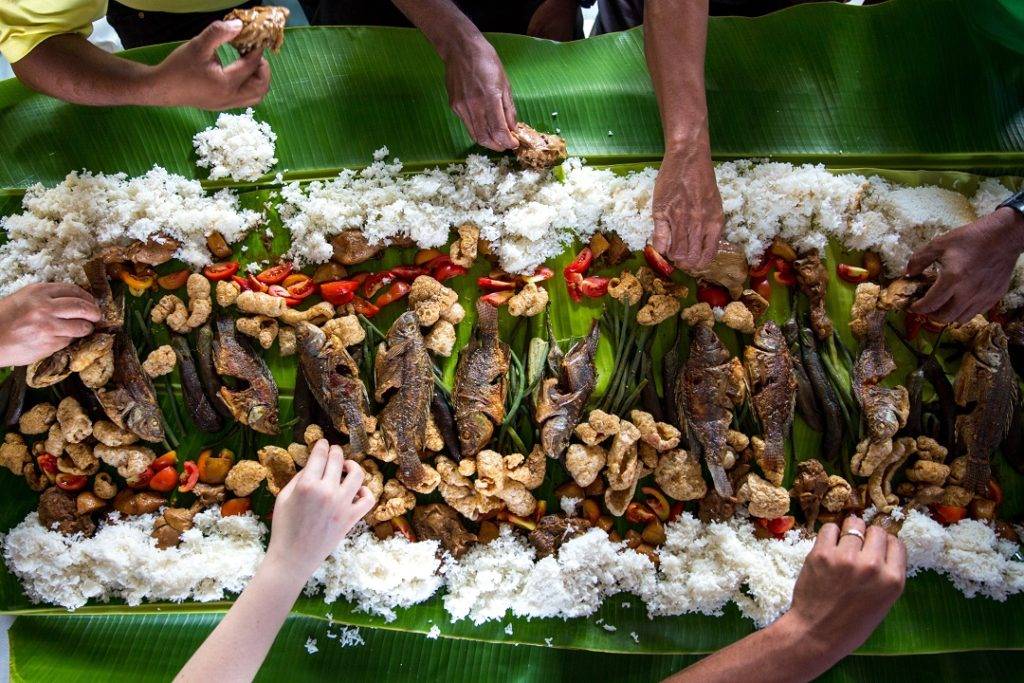
16 – Choose an accommodation with a kitchen
Food is an important part of any travel budget. While trying local food is a must (check out the weirdest food I’ve tried in Asia), you don’t need to eat out all the time. Having a kitchen will allow you to buy food at the grocery, which is usually cheaper than eating out, and cook your own meal.
17 – Do you really need that third beer?
Drinks are another important part of the budget, especially as it’s more expensive in bars and restaurants. Drinks are something you don’t really need (apart from water of course) if you can’t go with some OJ in the morning or a beer at night, buy them at the supermarket rather than in a restaurant or bar.
18 – Bring a refillable bottle
When traveling, always bring a refillable water bottle, so you don’t have to buy plastic ones all the time. You can refill from the tap in countries where the tap water is filtered, otherwise, hotels and even restaurants will usually gladly refill your bottle.
In countries where the tap water is not drinkable, get a LifeStraw water bottle (a refillable bottle with a filter) so you can fill it up with any type of water.
19 – Eat at local eateries rather than fancy restaurants
Street food and local eateries are a must when you’re traveling and they’re usually way cheaper than nicer restaurants. Some people are often worried about these places not being hygienic, well, let’s just say that in countries where hygiene norms are not as strict, it’s not because you pay more that it’s safer.
Saving on tours and activities

20 – DIY vs tours
Another important part of any travel budget is activities, try as much as you can do things on your own instead of taking tours. Most attractions can usually be done on your own, and you can usually find free alternatives to tours.
21 – Find free activities
Always look for free activities you can do, many cities offer free walking tours for instance. In cities where the Couchsurfing community is really active, you’ll find tons of free activities you can join. Some cities have days where museums or the entrance to some sights is free.
A good idea would be to contact the tourism office and ask for the free activities they offer.
22 – Buy a city pass
A city pass will allow you to save tons of money if you’re planning on visiting many attractions within the same city. Check the price of each place you want to visit first then compare the total to the price of the city pass to see if it’s worth it.
Saving on transportation

23 – Take local transportation
Instead of paying for a cab each time or renting a car, consider using public transportation instead. Do your research beforehand and find a way to get from the airport to your hotel and find out how you’re going to travel from one place to another after.
You can also check if the city you’re visiting offers a day/48 hours/weekly pass. These are usually worth it only if you’re planning on using public transportation many times on the same day.
24 – Take night buses/trains
Traveling at night is usually cheaper and will make you save the cost of a night at the hotel. In some places, you can find very comfortable transportation (you get a bed in the night buses in Vietnam for example).
25 – Consider hitchhiking
In most of the world, you can easily hitchhike. I’ve done it alone many times in countries that are not considered safe, and I’ve always been fine (people are scared for you so they stop more easily). It’s a great way to meet locals and save money.
Saving on shopping
26 – Learn the correct prices and avoid scams
In many countries, prices are fixed and clearly stated, in others, it’s not that easy. Locals will often try to raise their prices when they see tourists. Ask your hotel or a local first about prices, so you know more or less how much what you want to buy costs.
27 – Learn to haggle
Haggling is another skill you’ll need to learn for some countries. Sometimes sellers will raise the prices not because you’re a tourist but because they’re used to locals trying to haggle down the price. Haggling is expected of you in many countries, but it doesn’t mean you need to haggle for everything, don’t over do it. Don’t haggle at the hotel for instance, unless you’re going to spend a week or something. Haggle at markets, or at souvenir shops.
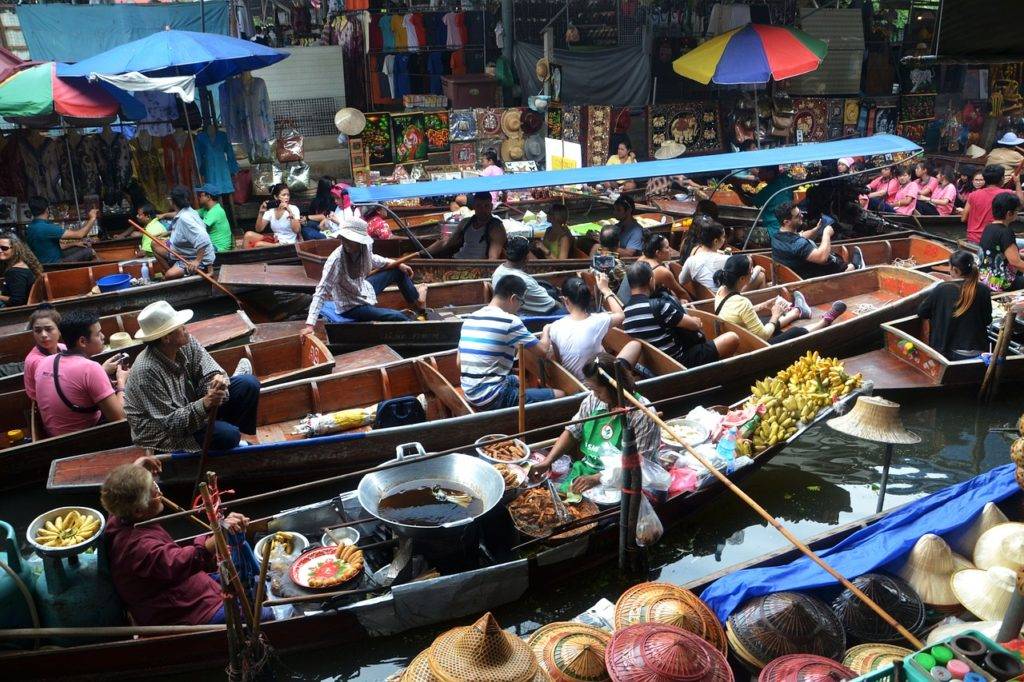
28 – Don’t buy souvenirs
This goes hand in hand with the travel light tips. The more stuff you buy the more weight you’ll have to carry. Buy small and inexpensive stuff, if you really want to bring something home (postcards, magnets…). In most countries, souvenirs are made in China, and local handicrafts are expensive.
It’s tempting to want to buy local handicrafts, and it all comes down to what you want to spend your money on: stuff or experiences? The less you spend on objects, the more you’ll be able to spend on travel.
Money tips
29 – Keep track of your spendings
Keeping a log of how you spend your money is essential when you’re traveling on a tight budget. This way you can visualize where your money goes, how much you’ve spent, and how much you still can spend. It will also help you reflect after your trip and see how you could have saved more money to improve on budgeting for your next trip.
30 – Use the country’s currency
Many countries accept dollars and euros, many people also apply a terrible exchange rate. It will always be cheaper to pay in the country’s currency.
31 – Switch to a bank with no international fee
Banking fees can be huge when traveling abroad, make sure your bank doesn’t apply fees on withdrawals and payments, also check the exchange rate they offer (it should be the mid-market visa or Mastercard exchange rate).
32 – Use ATMs
Don’t exchange money, use local ATM. Do your research beforehand to find a bank that doesn’t apply any withdrawal fees for international cards (it will depend on the type of card you have and the country it was emitted in). You usually will be able to find a bank that doesn’t apply a fee or has a minimal one (it sometimes can be over 5$ with a low maximum amount you can withdraw at once).
To conclude, if you have almost no money to travel, get the cheapest flight you can find and do a Workaway where they also feed you for the all duration of your trip. If you can afford to move around, use Couchsurfing and avoid eating and drinking out, and don’t go on tours when you can go on your own.
What about you? What do you do to save money when you’re traveling? What is your biggest struggle budget-wise?
Like it? Save it for later:
